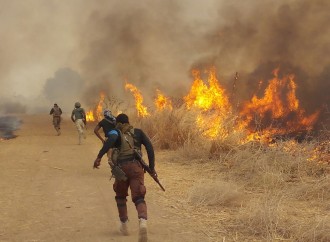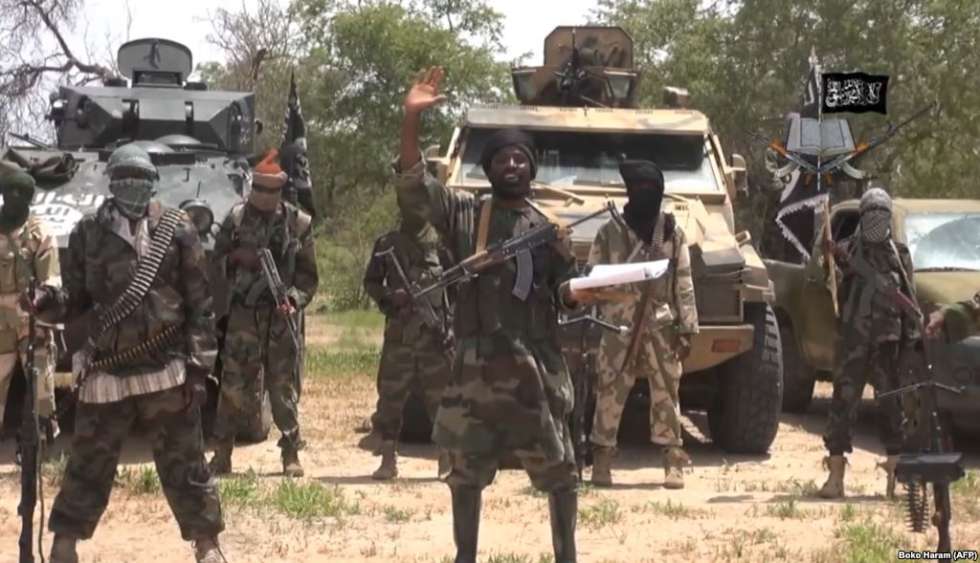Borno State Commissioner of Police (CP), Damian Chukwu, says two female suicide bombers that attempted to attack Alikaramanti village in Giwa Barracks of Maiduguri have died.
Also, residents of Fori, Jiddari Polo and Lawanti communities of the metropolis had been frightened by two blasts from Improvised Explosion Devices (IEDs).
In a statement yesterday in Maiduguri by the spokesman to the state police command, Joseph Kwaji, the CP said: “On Wednesday, March 14, 2018 at about 20:25 hour, two female suicide bombers in an attempt to infiltrate Alikaramanti area, after Giwa Barracks, were intercepted by security operatives on duty. The suspects hurriedly detonated the IEDs strapped to their bodies, killing themselves and injuring nine others.

“The Explosive Ordinance Department (EOD) team was immediately mobilised to the scene, and has returned normalcy to the affected areas.”
He added that the bodies had been deposited in a nearby morgue while the injured are currently receiving treatment at an undisclosed hospital.
However, the United Nations for the Coordination of Humanitarian Affairs (UN-OCHA) has earmarked $9 million (N1.9 billion) to scale up life-saving aid to 60,000 women and children recently displaced by hostilities in Borno State.
Of the amount, $2 million (N612 million) has been budgeted to support UN Humanitarian Air Services for front line respondents in the North East region affected by the Boko Haram insurgency.
The Information Officer of UN-OCHA, Yasmina Guerda, in a statement yesterday in Maiduguri, said the humanitarian crisis in the zone remains one of the most severe in the world, displacing 7.7 million people as at this year.
She noted that the worst affected states in the region were Borno, Adamawa and Yobe.
The humanitarian agency is, therefore, targeting 6.1 million people, comprising about 80 per cent of them in dire need of assistance to survive.
On how the $9 million was to be expended, Guerda noted: “This allocation will help fund 15 projects. It will support humanitarian rapid response in areas recently affected by large-scale conflict-related displacements, particularly in the northern parts of Borno, along the Maiduguri-Monguno axis.
“In just three months, about 30,000 persons have fled the violence in areas that are hard to reach for international humanitarian organisations.”
According to the statement, these persons are in dire need of food, water, shelter, blankets, clothes and medical services.
She explained that the funds would help scale up the response near the border with Cameroun in eastern Borno, comprising Gwoza, Bama, Dikwa, Kala/Balge, Monguno and Askira/Uba council areas.
Other persons in dire need of life-saving support are from northern Adamawa areas of Madagali, where another 30,000 persons have arrived in just three months following military operations along Mandara mountains and hills.
Also yesterday, Governor Kashim Shettima of Borno state attributed the Boko Haram’s “attacks and abductions in Rann and Dapchi to insurgents’ defeat led by the military.”
During an emergency Security Council Meeting (SCM) at Government House, Maiduguri, he said the ‘gallant security forces’ were on top of the situation, while the remnants of the insurgents had long become a spent force.
His words: “This attack and similar incidents like the abduction of the schoolgirls in Dapchi, Yobe State, were unfortunately the unpleasant consequences of the heavy defeat the insurgents suffered in the hands of our military. The visible manifestation of terrorists’ desperation has portrayed them not as a formidable force.
“In fact, President Muhammadu Buhari has aptly described their current despicable actions as the last kicks of a dying horse.”
On the activities of non-governmental organisations (NGOs) demanded by the Theatre Commander of Operation Lafiya Dole, Maj-Gen. Rogers Nicholas, the governor said: “I have approved the setting up of a high-powered committee to conduct a thorough and meticulous exercise on the NGOs.
“The committee’s main terms of reference were to identify NGOs’ areas of operations and sources of funding. Members of the committee are to profile their staff and whether or not they are duly registered by the relevant federal authorities.”
The panel, according to him, is to find out whether the NGOs in the state were exploiting the security challenge to better themselves.

